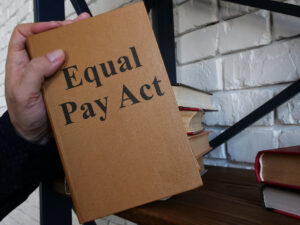Race Discrimination
What laws apply in employment race discrimination cases?
A number of different laws prohibit race discrimination in employment but two of the key statutes are Title VII of the 1964 Civil Rights Act and 42 U.S.C. 1981. Talk with an experienced race discrimination employment lawyer today to learn more about your legal options.
Title VII of the 1964 Civil Rights Act
The U.S. Department of Justice provides the following helpful summary of Title VII:
Title VII makes it unlawful to discriminate against someone on the basis of race, color, national origin, sex (including pregnancy and gender identity) or religion. The Act also makes it unlawful to retaliate against a person because the person complained about discrimination, filed a charge of discrimination, or participated in an employment discrimination investigation or lawsuit.
Title VII prohibits not only intentional discrimination, but also practices that have the effect of discriminating against individuals because of their race, color, national origin, religion, or sex.
42 U.S.C. 1981 (Section 1981)
Originally included as part of the Civil Rights Act of 1866, Section 1981(a) states in relevant part:
All persons within the jurisdiction of the United States shall have the same right in every State and Territory to make and enforce contracts, to sue, be parties, give evidence, and to the full and equal benefit of all laws and proceedings for the security of persons and property as is enjoyed by white citizens, and shall be subject to like punishment, pains, penalties, taxes, licenses, and exactions of every kind, and to no other
On a broader level, both statutes outlaw employment discrimination based on race. But key differences exist between these two related laws that can make or break your case. These differences played a vital role in a U.S. Court of Appeals for the Fourth Circuit employment discrimination and retaliation case that Eric Bachman previously argued and won.
How do I prove race discrimination at work?
To establish a prima facie case of race discrimination based on intentional discrimination an employee must show that they:
- are a member of a protected class,
- suffered an adverse employment action,
- met their employer’s legitimate expectations at the time of the adverse employment action, and
- were treated differently from similarly situated employees outside their protected class.
If these elements are met then the employer must articulate a non-discriminatory reason for the adverse employment action. If an employer does so, then the employee has to prove by a preponderance of the evidence that the employer’s articulated reason is a mere pretext/ excuse for discrimination.
It is important to consult with an experienced race discrimination employment lawyer to understand your legal options.
What remedies are available for race discrimination?
- Back pay damages for wages lost due to the harassment
- Emotional distress damages (also referred to as compensatory damages)
- Punitive damages designed to punish the employer for especially reckless or malicious harassment
- Reasonable attorney’s fees
Related articles and interviews by Bachman Law
Bachman Law routinely represents executives and senior managers in race discrimination cases. Likewise, Bachman law frequently writes, and is quoted about, race discrimination by various media outlets, including:
- Society for Human Resource Management (SHRM) interviewed Eric Bachman about the EEOC’s $1.2M settlement in a race discrimination case
- Law360 interviews employment discrimination lawyer Eric Bachman about massive $460M verdict
- $35 million settlement reached in racial discrimination/glass ceiling cases against Wells Fargo
- 5 differences between Section 1981 and Title VII that can help your employment race discrimination case
- $32.5 million settlement in employment race discrimination case against MetLife
- The glass ceiling thins the ranks of Black managers in the financial services industry
- 4 steps toward demolishing the “concrete ceiling” that Black executives face
For more information, see our Frequently Asked Questions (FAQs) page that answers many common questions in plain English.
If you have experienced workplace discrimination or whistleblower retaliation, call us at (202) 769-1681, or start your preliminary consultation online.

Latest From The Glass Ceiling Discrimination Blog

Bachman Law recognized in the 2024 Best Lawyers in America list
Bachman Law principal Eric Bachman was recently named to the 2024 Best Lawyers in America in the fields of Employment Law/Civil Rights. Bachman has been

The Equal Pay Act: 60 years of progress toward closing the pay gap
Sixty years ago Congress passed the Equal Pay Act, which has resulted in significant gains for female employees toward achieving “equal pay for equal work.” What

Eric Bachman interviewed about the EEOC’s $1.2M employment discrimination settlement
The Society for Human Resource Management (SHRM) interviewed Bachman Law founder Eric Bachman regarding the recent $1.2 million settlement that the Equal Employment Opportunity Commission